Key takeaways:
- Zero-waste cooking emphasizes sustainability by maximizing ingredient use and minimizing food waste, fostering creativity in the kitchen.
- Planning meals and effectively utilizing food scraps, such as making stock from vegetable peels, are essential components of zero-waste cooking.
- The transition involves overcoming ingrained habits and changing mindsets, seeking out sustainable options despite societal pressures.
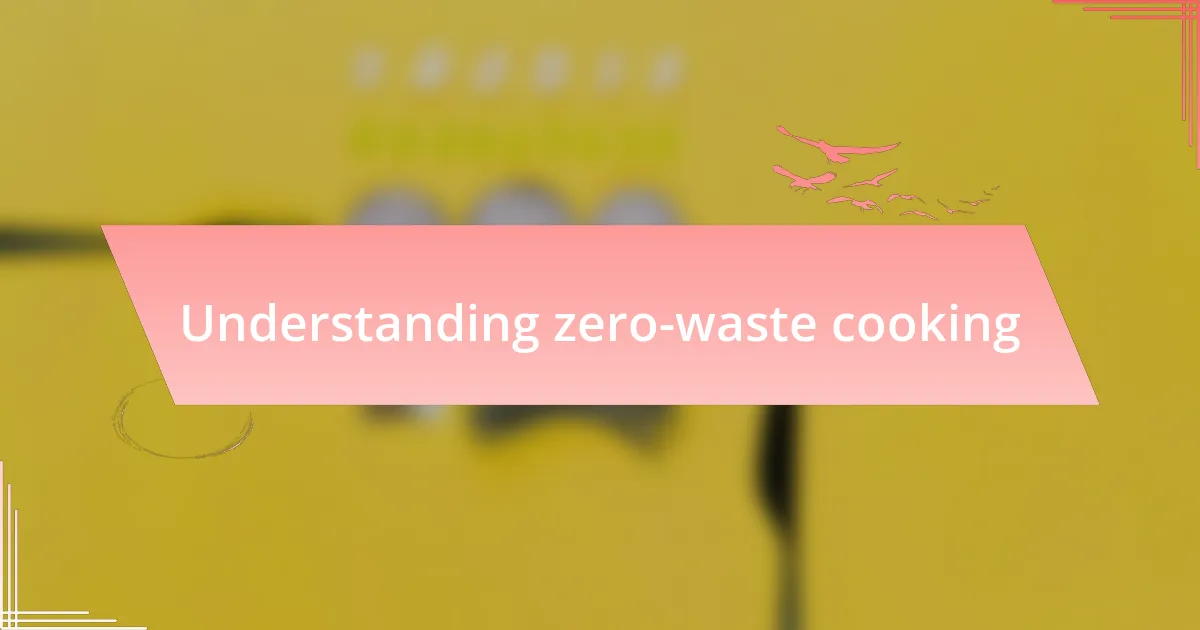
Understanding zero-waste cooking
Understanding zero-waste cooking goes beyond just a trend; it’s a lifestyle that embraces sustainability and resourcefulness. I remember the first time I looked at my vegetable scraps and thought, “These could actually be something!” That moment sparked a journey into transforming what many consider waste into flavorful stocks and vibrant veggie chips.
At its core, zero-waste cooking is about maximizing every ingredient you have, creating meals with minimal environmental impact. Have you ever considered how much food ends up in the trash? I found myself shocked by the statistics, prompting me to rethink my cooking habits and adopt practices like composting and using every part of the plant. For example, the tops of carrots and radishes can elevate salads with their peppery kick instead of being tossed aside.
This approach also fosters creativity in the kitchen. I’ve discovered that necessity truly is the mother of invention. When I had leftover bread, for instance, I turned it into crunchy croutons instead of just letting it sit stale. Isn’t it exhilarating to see how reimagining leftovers can lead to new dinner delights?
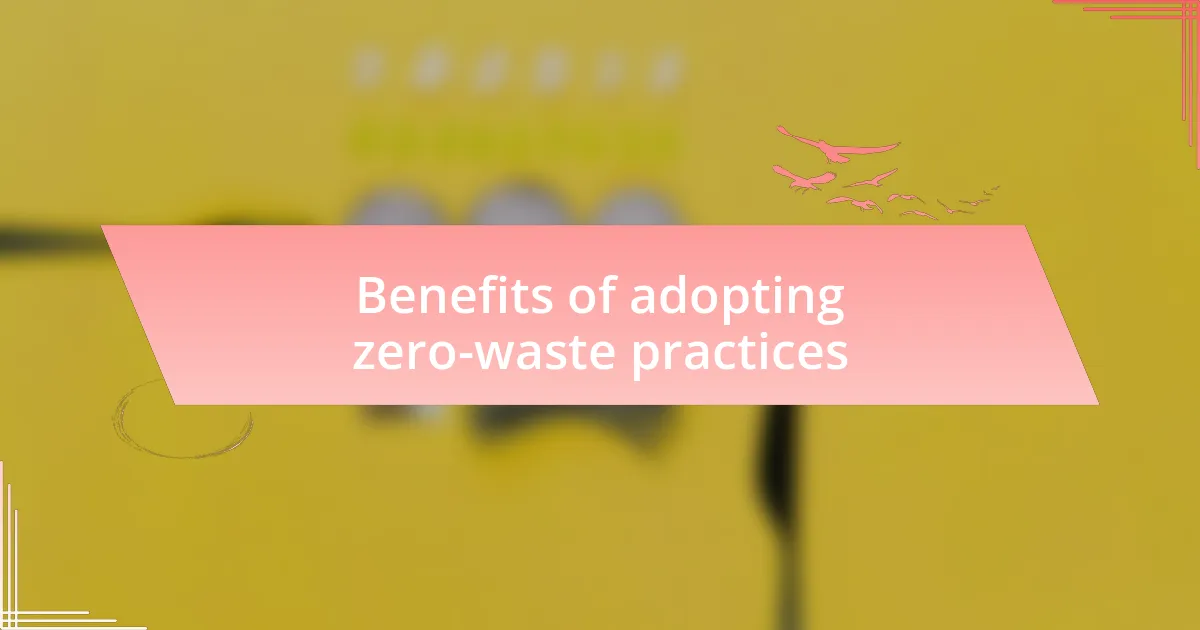
Benefits of adopting zero-waste practices
Embracing zero-waste practices has significantly improved my cooking experience. Initially, I felt overwhelmed, but soon I found that using every part of an ingredient could lead to delightful new dishes. For instance, after making a smoothie, I realized the leftover pulp could be incorporated into muffins, adding texture and nutrients while minimizing waste. Have you ever thought about how one small change can lead to countless culinary creations?
Beyond creativity, adopting zero-waste cooking has a profound impact on my purse strings. After shifting my focus to using everything I buy, I found myself spending less on groceries. The extra time I invest in planning meals and using scraps pays off not just environmentally, but economically. Isn’t it empowering to see your efforts translate into real savings?
Moreover, the sense of fulfillment I get from minimizing waste feels incredibly rewarding. It connects me to the food I prepare on a deeper level. There’s something special about knowing that I’m doing my part to reduce my carbon footprint. With each mindful choice, I can’t help but feel a personal responsibility to contribute to a healthier planet. Who wouldn’t want that sense of purpose while cooking?
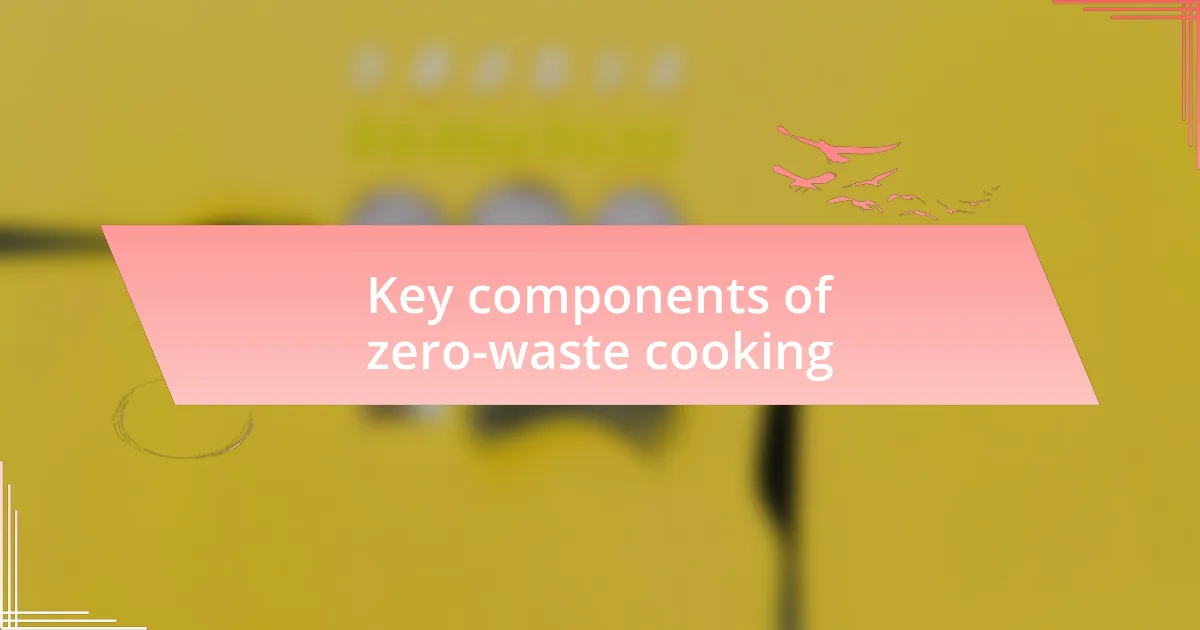
Key components of zero-waste cooking
One of the key components of zero-waste cooking is utilizing food scraps, and this really transformed my kitchen habits. For example, I started saving vegetable peels and stems, which I now use to create flavorful stock. Who would have thought that those bits I once tossed would turn into a rich broth? Each time I sip that stock, I feel a sense of pride knowing I turned what was previously considered waste into something nourishing.
Another essential aspect is meal planning, which sounds tedious but is truly a game-changer. By planning ahead, I can ensure that I buy only what I need, reducing impulse purchases and the risk of food spoilage. I recall a time when a single meal plan led to a week of delicious meals from just a handful of ingredients. It’s like a puzzle, where each piece fits perfectly into the next dish. Isn’t it amazing how a little forethought can shift the entire cooking experience?
Lastly, I discovered the importance of composting, which has become a natural extension of my zero-waste journey. Rather than throwing away scraps, I now integrate them into my garden. Watching my compost bin transform into rich soil is not just satisfying; it has also instilled a sense of connection to the earth in me. Have you ever experienced that thrill of nurturing growth from what you once deemed waste? It’s both humbling and inspiring.
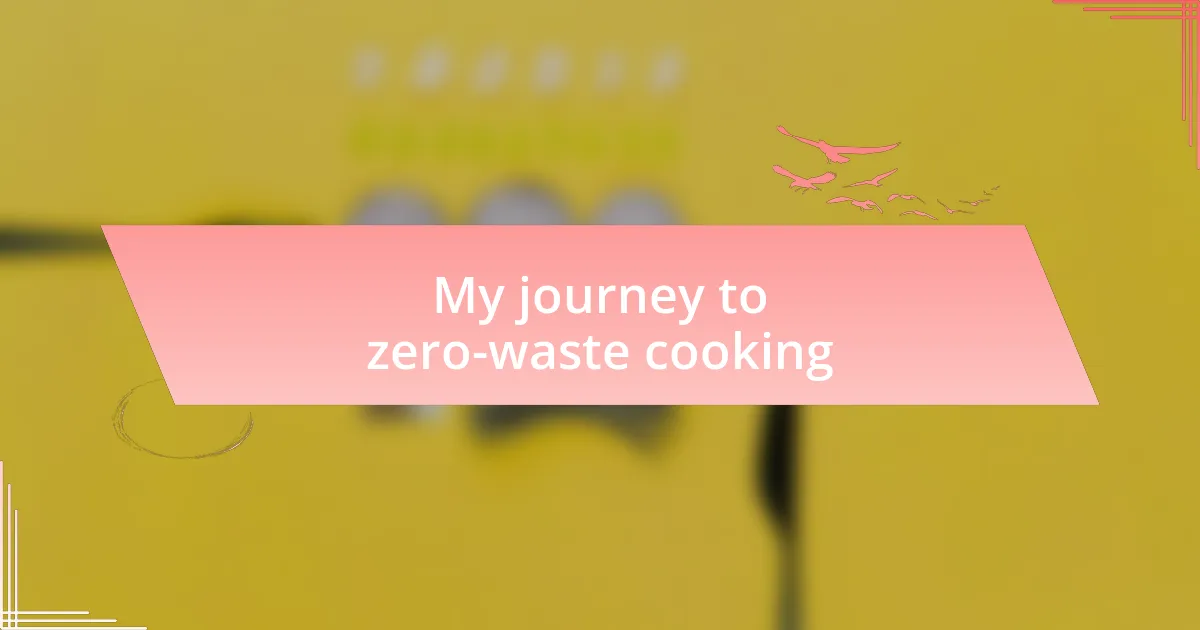
My journey to zero-waste cooking
As I embarked on my journey to zero-waste cooking, I found myself increasingly aware of the choices I was making. One day, while cleaning out my fridge, I stumbled upon those little bags of herbs wilting away, and it hit me—I was wasting not just food, but potential flavor. I decided to transform those forgotten bits into herb-infused oils, and now, every drizzle is a reminder of my commitment to minimizing waste. Isn’t it rewarding to turn what once felt like clutter into something vibrant and flavorful?
There was a moment that truly reshaped my perspective—when I hosted a dinner party using only zero-waste principles. My guests were surprised to learn that we were dining on remnants and saved ingredients, turning what could have been a lackluster meal into a creative feast. Seeing the joy on their faces as they tasted the unique flavors was a revelation for me. How empowering it felt to showcase that sustainability could be both delicious and fun!
Additionally, I realized that my transition wasn’t just about food; it involved a mindset shift. I began to approach grocery shopping like a treasure hunt, looking for bulk items or produce with imperfect appearances. Each trip became an adventure, and those offbeat vegetables often sparked my creativity in the kitchen. Have you ever noticed how the most unexpected ingredients can lead to your best culinary experiments? For me, embracing these imperfections has ultimately added a new layer of excitement to my cooking.
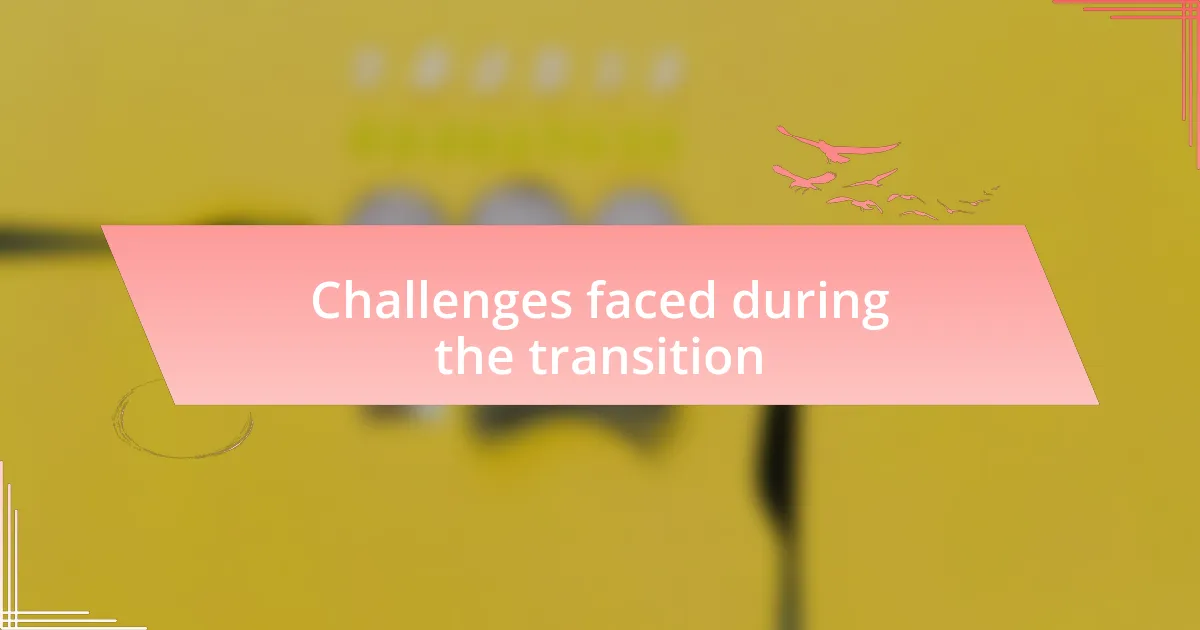
Challenges faced during the transition
During my transition to zero-waste cooking, one significant challenge was overcoming ingrained habits. I remember going grocery shopping and instinctively reaching for pre-packaged items out of convenience. It took conscious effort to retrain my brain to seek out loose produce and bulk options instead. Have you ever tried breaking a habit? It’s harder than it seems, especially when the familiar has become so comfortable.
Another hurdle was figuring out effective storage solutions for my food scraps and leftovers. Initially, my kitchen looked like a mini composting experiment—I had jars and containers sprawled all over the counter. It was overwhelming at times. I had to find a balance between efficient storage and accessibility. I discovered that labeled containers not only helped me keep track of everything but also made it easier to use what I had on hand. Do you ever find yourself forgetting about ingredients you bought? I certainly did, and it felt like a personal failure to waste what could have been a delicious meal.
One emotional aspect I grappled with was the societal pressure to conform to traditional cooking methods. Friends and family often questioned my choices, making me feel like a culinary outcast. I’ll admit, there were times I felt uncertain and underappreciated. But then, I found solace in online communities and forums where others shared similar experiences. It helped bolster my resolve to stay true to my values. Have you ever felt isolated in your beliefs? Finding support made a world of difference to me and reinforced that this journey was not just about cooking; it was about creating a sustainable lifestyle.